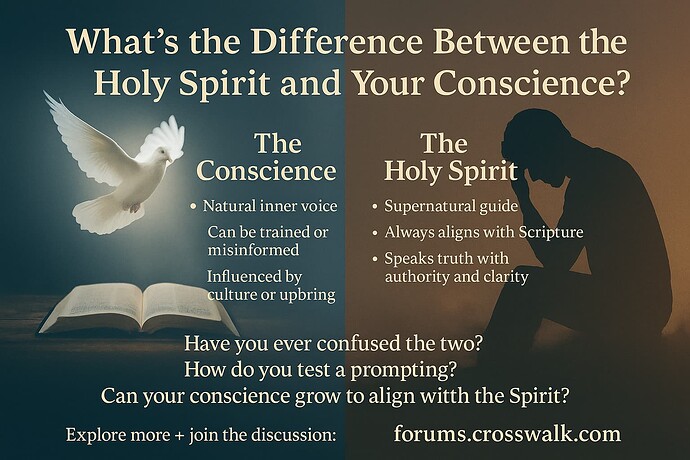@Fritzpw_Admin
The conscience and the Holy Spirit are not the same, though they can sometimes point in the same direction. The difference is not merely who’s speaking, but what nature is at work.
- The Conscience (συνείδησις | syneidēsis)-A Created Inner Witness
The Greek term συνείδησις (syneidēsis) literally means “a knowing-with” or “shared knowledge,” the inward faculty that witnesses to one’s own moral condition (see Romans 2:15, “their conscience bearing witness,” συμμαρτυρούσης τῆς συνειδήσεως αὐτῶν). In Hebrew thought, there’s no exact equivalent, but the idea is found in the לֵב (lev) or לֵבָב (levav)-the heart-which often includes the inner seat of thought, will, and moral judgment (see 1 Samuel 24:5, “David’s heart struck him,” Hebrew: וַיַּךְ לֵב־דָּוִד).
The conscience is part of natural revelation, it reflects the moral law written on the heart (Romans 2:14–15). But here’s the problem: the conscience can be defiled (συνείδησιν μεμιασμένην, Titus 1:15), seared (ἐντυπωσμένην ἐν τῇ συνειδήσει, 1 Tim 4:2), or weak (ἀσθενής, 1 Cor 8:7). It can lie. It can adapt to culture. It can be numb or hyperactive, depending on how it’s been shaped.
So yes, your conscience can convict you, but it can also deceive you. Like a smoke alarm, it can go off for real fires or burnt toast. It’s useful, but not infallible.
- The Holy Spirit (רוּחַ הַקֹּדֶשׁ | τὸ Πνεῦμα τὸ Ἅγιον)-God’s Indwelling, Guiding Presence
The Hebrew term is רוּחַ הַקֹּדֶשׁ (Ruach haQodesh) and the Greek is τὸ Πνεῦμα τὸ Ἅγιον (to Pneuma to Hagion)—the Holy Spirit, the third Person of the Trinity, not a human faculty but God Himself. He doesn’t just alert the believer to right and wrong-He indwells, sanctifies, convicts, teaches, guides, and reveals (John 14:26, 16:13; Romans 8:14; Galatians 5:16–18).
Whereas the conscience can only act within the bounds of what it knows or feels, the Spirit “searches all things, even the deep things of God” (1 Cor 2:10). He never contradicts Scripture, never lies, never flatters, never misleads. He convicts the world of sin, righteousness, and judgment (John 16:8, Greek: ἐλέγξει τὸν κόσμον περὶ ἁμαρτίας). The verb ἐλέγχω (elenchō) here means to expose, convict, refute, or bring into the light, something no mere conscience can do on its own.
The Spirit isn’t an inner feeling; He’s an indwelling Person. He doesn’t merely “nudge”-He leads (ἄγονται, Rom 8:14), teaches (διδάξει, John 14:26), speaks to the churches (Rev 2:7), and empowers holy living (ἐνέργεια, Eph 3:20).
- How to Tell the Difference?
Source: The conscience draws on human input, upbringing, culture, habits. The Spirit speaks by the written Word He inspired (2 Tim 3:16–17; 2 Pet 1:21). If your inner prompting contradicts Scripture, it’s not the Spirit, period.
Fruit: The Spirit produces fruit (Gal 5:22–23), aligns with truth, and leads to Christ-exalting obedience. The conscience might produce guilt, fear, or relief—but not spiritual transformation unless submitted to truth.
Clarity: The conscience gives vague senses of right and wrong. The Spirit speaks precisely, often using Scripture, conviction of sin, and counsel of other believers filled with the same Spirit.
- Can the Conscience Be Trained by the Spirit? Yes.
A Spirit-filled believer’s conscience becomes more accurate as it’s reformed by the Word of God and shaped by the Spirit’s work. Hebrews 5:14 speaks of those “who by constant use have trained their senses to discern good and evil”—that includes the conscience. The Spirit doesn’t erase the conscience, He sanctifies it. Paul says he strives to have “a clear conscience before God and man” (Acts 24:16), but that’s a product of ongoing Spirit-led sanctification.
Conclusion:
Your conscience is like a compass, it can point north, but it needs calibration.
The Holy Spirit is the true North-He is God, unchanging, holy, and always aligned with His Word.
Test the spirits (1 John 4:1). Weigh your inner nudges by the Word. Submit your conscience to Christ. And remember: the Holy Spirit doesn’t guess, He guides.
By the Word. By the Spirit. Not by vibes.
J.

